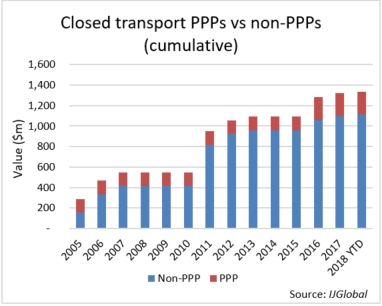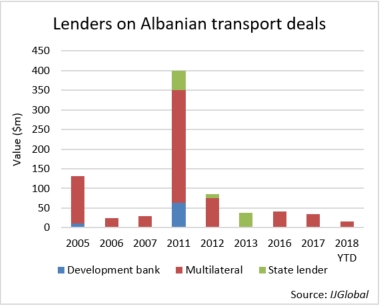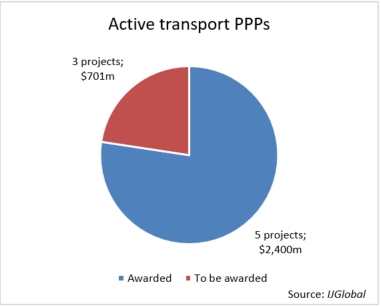Albania: Learning the ABC of PPP
In September this year (2018), Albanian Minister of Infrastructure and Energy Damian Gjiknuri reiterated his support of the PPP model as a means of improving public infrastructure in the country. Albania’s crumbling infrastructure is characterised by alarming deficiencies across various sectors – including roads, railways, telecoms, ports and airports – constraining trade and connectivity with neighbouring countries, as well as making the country less attractive to foreign investors.
IJGlobal cumulative data for the years 2005-2018 (year-to-date) suggests that Albania’s PPP track record leaves some room for improvement.
In February 2017, Prime Minister Edi Rama announced an ambitious €1 billion PPP programme that aims to develop road infrastructure and investments in healthcare and education in the next few years. This, despite grave criticism from the International Monetary Fund (IMF), which accused the government of awarding concession contracts without financial analysis or adequate transparency. The IMF warned that the concessions were not based on feasibility studies, and were being used by the government to obscure the true level of public debt.
According to the IMF, poor infrastructure and corruption posed the greatest challenges to doing business in Albania last year (2017).
A long road ahead
According to the World Bank, roads rank among the largest public assets in Albania. However, the IMF paper “Public Infrastructure in the Western Balkans: Opportunities and Challenges” suggests that the country is 80% below the EU average for motorway density, and has yet to come up with a solution to the constricting combination of high public debt burden and large financing needs.
Although multilateral lending in the Albanian transport sector has been consistent historically, PPP schemes could prove viable alternatives to bridging Albania’s infrastructure gap and to overcoming the challenges related to the maintaining of road conditions – but only if the model is implemented in parallel with a strong legislative framework.
The country’s experience with PPPs is limited, and the model has been applied only to a small number of projects so far. Among these are:
- Adriatic-Ionian Motorway
- Milot-Morine Highway
- Rruga e Arbrit (Arber Road)
- Tirana International Airport
- Tirana Public Transport Terminal
Even these projects have not been completely immune to the negative tendencies, however.
The Milot-Morine highway tender to redevelop a 114km stretch of mountainous road in the north of the country fell victim to Albania's unclear procurement process. After the government initially granted the concession to a Turkish consortium, the second-ranked bidder took over after the deal was cancelled on the grounds of corruption allegations.
Another example is the €250 million, 27km Arber Road connecting Tirana to the region of Diber on the Macedonian border – the first concession granted in 2017 under the PPP plan – which brought to light the questionable economic policy behind the Prime Minister's programme. The project drew criticism from the IMF, which accused the government of deliberately inflating construction costs and lacking transparency by awarding "secret" contracts.
Nevertheless, the tender of Tirana International Airport could be considered the single most important step to linking Albania to neighbouring countries, in parallel with its EU integration. The PPP framework allowed for adequate financial and human resources to be put into action. Private partners with sufficient experience managed to deliver an international airport meeting European standards.
Although the PPP scheme is a viable option for delivering infrastructure in Albania, inflows of foreign investment could be obstructed by policies in place. Ultimately, the country will be able to follow up on its transport PPP pipeline, if it acts on much needed legislative reforms.
A move in this direction was made in early 2018 when the Ministry of Infrastructure and Energy and Albanian Roads Authority started training their staff on PPP schemes and strengthening their legislative framework. In addition, a promise was made that unsolicited proposals will not be accepted starting from 2019.
Request a Demo
Interested in IJGlobal? Request a demo to discuss a trial with a member of our team. Talk to the team to explore the value of our asset and transaction databases, our market-leading news, league tables and much more.




